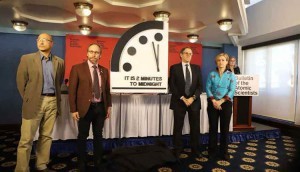As of Thursday 25 January 2018, the time on the Doomsday Clock stands at two minutes to midnight, 30 seconds closer to Armageddon than January 2017. This is the first time humanity has been this close to nuclear war since 1953 during the pursuit of the hydrogen bomb.
The Doomsday Clock is maintained by The Bulletin of Atomic Scientists, a non-profit organization, remnant of the Manhattan project. Every year various political and non-political events are taken under consideration so as to predict how close mankind is to nuclear Armageddon. The Doomsday Clock was first established in 1947 and it was set at seven minutes to midnight, with midnight suggesting extinction-level events.
According to the website of the Bulletin “The Clock has become a universally recognized indicator of the world’s vulnerability to catastrophe from nuclear weapons, climate change, and new technologies emerging in other domains”.
The change was accompanied by a statement, which conveys how grim things are. The world leaders failed to address severe issues such as the impending climate change and the possibility of a devastating nuclear war, suggesting that the world is as dangerous as it was during WWII.
On the nuclear front it is impossible to ignore the escalating crisis between North Korean leader Kim Jong-Un and US President Donald Trump, as 2017 was marked with a number of missile tests demonstrating Pyongyang’s capabilities along with a Twitter-war further fueling the raging fire.
Russia also played its role as tensions remain high between the former superpower and the member-states of NATO. On the other side of the world, the situation in South China Sea remains explosive and the rivalry between nuclear Pakistan and India has not been dialed down. Finally, the White House has expressed it will withdraw from the Iranian nuclear deal. Until May 2018, during which time President Trump will have to renew the waiver on Iranian sanctions, the deal will remain intact, but after that we are entering uncharted territory despite pressure by the EU to continue support.
On the climate change front, the Bulletin stresses that even though the danger seems less immediate, data suggests that global carbon dioxide emissions have not yet shown the beginnings of the sustained decline towards zero that must occur if ever-greater warming is to be avoided. 2017 was declared among the three hottest years on record, with vicious phenomena destroying major cities leaving many dead behind.
Last but not least, the Bulletin is highlighting the adverse effect technology is having on democracies, as now the technologically advanced states seek and exploit opportunities to use information technologies as weapons, so that they can undermine elections and manipulate public opinion.
Source: thegreekobserver.com
Ask me anything
Explore related questions





